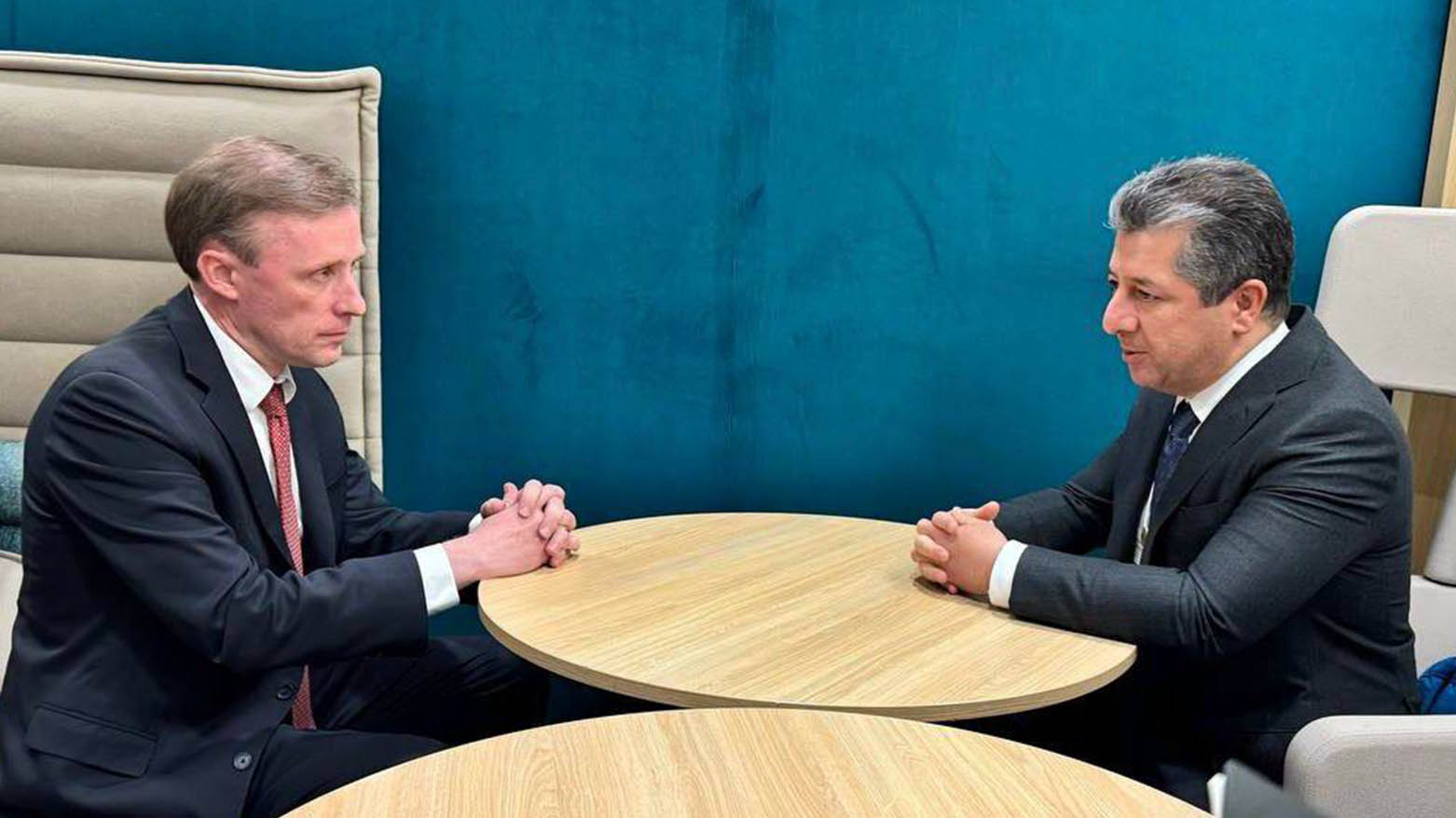White House ‘Reaffirmed U.S. Support’ for Kurdistan Region, as National Security Advisor Jake Sullivan and Kurdish Prime Minister Masrour Barzani meet at Davos

WASHINGTON DC, United States (Kurdistan 24) – U.S. National Security Advisor Jake Sullivan met with the Prime Minister of the Kurdistan Region, Masrour Barzani, on Tuesday in Davos, Switzerland on the sidelines of the World Economic Forum.
It was the first meeting between the two senior figures, at least in their current positions, reflecting the greatly increased salience of the Middle East to the Biden administration since Oct. 7.
The discussion between Sullivan and Barzani involved three major issues of concern to the people and government of the Kurdistan Region.
They include: 1) Iran’s ballistic missile strikes on the Kurdistan Region; 2) the need to resume Kurdish oil exports; and 3) assuring proper payments from the Iraqi government to the Kurdistan Regional Government (KRG) for its share of the federal budget.
Indeed, when Joe Biden assumed office in January 2021, he had more experience in national security matters than any U.S. president over the past 30 years—since George H.W. Bush, who had been Director of the CIA and Vice-President under Ronald Reagan, before he was elected U.S. president.
Biden was also the first U.S. president to take office with a very friendly attitude toward the Kurds. As a senator from Delaware, he long served on the Senate Foreign Affairs Committee. In 2007, as the Committee’s top Democrat, Biden joined with his colleague, Sen. Sam Brownback (R, Kansas), who chaired the committee’s Middle East subcommittee, to sponsor a bipartisan, non-binding resolution advocating a decentralized, federal system for Iraq.
Their resolution called for establishing three autonomous regions, in accord with Iraq’s post-Saddam constitution: Kurdish, Sunni Arab, and Shia Arab.
The measure was welcomed by the KRG, which issued a statement affirming, “The people of Kurdistan, who have struggled for decades to achieve democracy and freedom, see in federalism the promise of stability and freedom from dictatorial regimes. We welcome this significant resolution in support of federalism, which guarantees the survival of Iraq on the basis of voluntary union.”
A decade later, in late 2017, this reporter chanced to see Biden at a local grocery store. He was no longer vice-president, but was probably planning to run for president, at least if circumstances allowed.
People had gathered around Biden, and they were asking him questions. He had no obligation to answer anyone’s questions—he was on a private trip to buy groceries!
Read More: Super Tuesday: Joe Biden and the Kurds
But since Biden was answering those questions and being quite pleasant about it, I joined in with a question of my own: why didn’t the Obama administration have a better policy toward the Kurds?
“Masoud Barzani is a good friend of mine,” Biden responded, “and I wished we could have done more for the Kurds.”
“Why didn’t you?” I asked. “Turkey,” he answered.

Sullivan-Barzani Meeting
According to the White House read-out of their meeting, “Sullivan expressed appreciation for the Kurdistan Region’s strong partnership with the United States and reaffirmed U.S. support.”
“Sullivan strongly condemned Iran’s reckless ballistic missile attacks,” the White House statement continued. That attack struck the home of a prominent Kurdish businessman, Peshraw Dizayee, killing him and his family.
Thus, Sullivan “offered condolences for the tragic deaths of four civilians in these attacks,” the White House said, “including an infant less than one year old”—reference to Dizayee’s 11-month old daughter, Zhina.
Read More: Four civilians killed in missile attack on Erbil
“Sullivan and Barzani also discussed the importance of resuming oil exports and maintaining financial flows from federal Iraq to the Kurdistan Region in support of the region’s stability and oil exports,” the White House statement added.
Blinken-Barzani meeting
The Kurdish Prime Minister also met earlier on Tuesday with U.S. Secretary of State, Antony Blinken. Again, it was the first meeting between the two senior officials in their current capacity, underscoring the new importance of the Middle East to the Biden administration.
However, they had met some nine years ago. In May 2015, a Kurdish delegation, led by Masoud Barzani, then head of the KRG, visited Washington to coordinate the fight against ISIS, which had begun the year before, as the terrorist group burst out of Syria into Iraq, seizing one-third of the country.
As head of the Kurdistan Region Security Council, Masrour Barzani was a member of the delegation, which met with Blinken, then Deputy Secretary of State.
According to the State Department read-out of that meeting, Blinken and the Kurdish President “discussed a range of issues, including the important role of the Kurdish Peshmerga and the Kurdish people in the fight against ISIL [ISIS.]”
“Blinken offered condolences to President Barzani,” the State Department statement continued, “for the people who have lost their lives throughout Iraq from terrorist attacks, including more than one thousand Kurdish Peshmerga who have fallen victim to ISIL’s brutality and the many more who have been wounded.”
“The Deputy Secretary also underscored the historic relationship the United States shares with the Kurdistan Regional Government and its people and emphasized our full commitment to that relationship,” it added.
In his meeting on Tuesday with the Kurdish Prime Minister, Blinken condemned the Iranian missile attack on Erbil, while he also extended his greetings and appreciation to Masoud Barzani.
Read More: PM Barzani, US Secretary of State Blinken address security and stability in Kurdish region
Blinken later tweeted, “Spoke with Prime Minister @masrourbarzani today in Davos following Iran’s attack on the Iraq Kurdistan Region yesterday,” as he affirmed, “The Kurdistan Regional Government is a close partner, and the United States unequivocally condemns Iran’s aggression.
Spoke with Prime Minister @masrourbarzani today in Davos following Iran’s attack on the Iraq Kurdistan Region yesterday. The Kurdistan Regional Government is a close partner, and the United States unequivocally condemns Iran’s aggression. pic.twitter.com/MadaRHhGVg
— Secretary Antony Blinken (@SecBlinken) January 17, 2024
